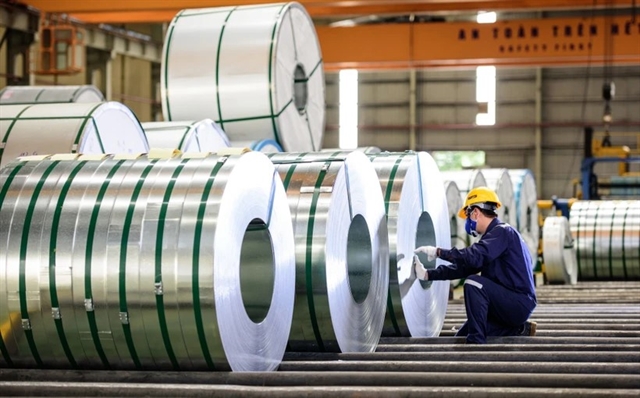 Economy
Economy


|
| A worker inspects finished rolled steel at a factory in the southern province of Bà Rịa-Vũng Tàu. — VNA/VNS Photo |
HÀ NỘI — To stay competitive in the European Union (EU) market, Vietnamese producers must adapt to the Carbon Border Adjustment Mechanism (CBAM), a carbon tariff on carbon-intensive products imported to the EU, which has been set to take effect in 2026, said industry experts and policymakers.
According to a report by the General Department of Vietnam Customs, in January 2024, Việt Nam exported over 1.16 million tonnes of steel, worth US$822.65 million, an increase of 7.1 per cent in quantity and 7.4 per cent in value compared to the previous month. Vietnamese steel was exported to more than 30 countries and territories, including Canada, South Korea, Japan, Singapore, Australia and Sri Lanka.
Việt Nam exported 180,221 tonnes of fertiliser, equivalent to $72.9 million, during the same period, a 10.6 per cent increase in quantity and a 7.7 per cent decrease in value compared to the previous month. However, the overall year-on-year figures showed a 41.7 per cent increase in quantity, a 14 per cent increase in export turnover, but a 14.5 per cent decrease in value.
The Southeast Asian economy reported a total export turnover of $33.57 billion, a 6.7 per cent increase from the previous month and a significant 42 per cent increase compared to last year.
Exporters have long voiced their concerns over the CBAM's potential effects on Vietnamese exports, saying CBAM's implementation will likely increase the prices of exported goods, reducing Vietnamese exports' competitiveness and affecting demand in the EU market.
However, the impact is likely minor in a broader context as the covered industries are not Việt Nam's major exports. Nevertheless, the carbon tax regulations will still reduce export values, increasing pressure on businesses, according to the Asian Development Bank (ADB).
Specifically, the steel sector may experience a 4 per cent decrease in export value, leading to a 0.8 per cent reduction in demand and adverse effects on market competitiveness. Aluminium export value may decrease by over 4 per cent, resulting in a 0.4 per cent reduction in production. The impacts on the cement and fertiliser are negligible.
However, as the new regulations directly impact export activities Việt Nam must start proactively engaging with the CBAM framework to avoid being at a disadvantage in the export competition.
Industry experts have called for policymakers and businesses to establish carbon pricing mechanisms and a carbon credit market in Việt Nam, which will allow exporters to work with EU buyers and serve as a platform for trade negotiations related to CBAM.
At the same time, dialogues should be held with EU regulatory bodies to provide additional information and incentives to exporters in support of transitioning to green production. To minimise the adverse effects on production and exports, businesses must closely monitor CBAM developments and proactively prepare response plans.
They stressed the importance of thoroughly studying greenhouse gas emission reporting requirements, developing internal processes and implementing calculation systems to comply with CBAM reporting. In the long run, the global shift to a greener economy, the development of green energy and sustainable production will bring opportunities for Vietnamese businesses to enhance product quality, meet international standards and achieve sustainable development. —VNS




